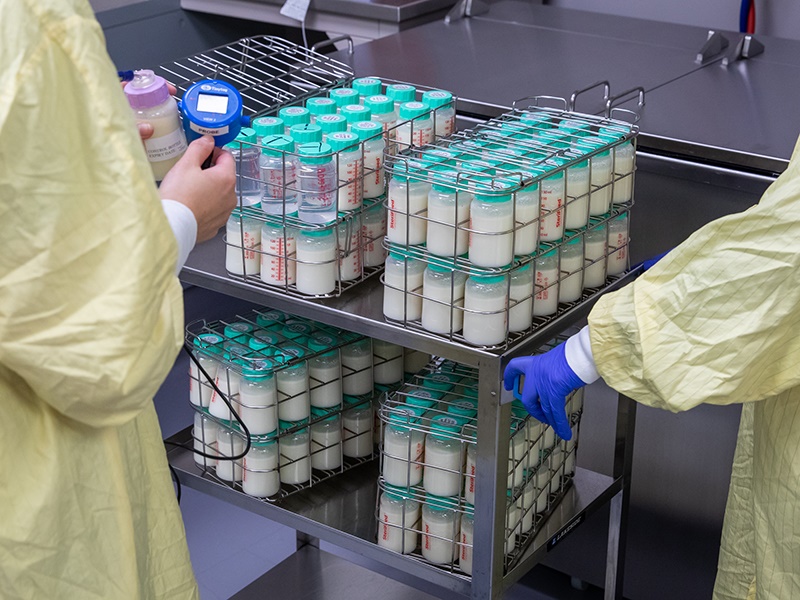Ongoing research hopes to optimize the quality of donor human milk by improving pasteurization methods

Human milk is widely considered the gold standard for feeding infants. Its properties are especially important for infants born preterm, not only for nutritional value, but for growth, neurodevelopment, and protection against infection.
Milk donated to the Rogers Hixon Ontario Human Milk Bank is currently pooled and processed via Holder pasteurization, to ensure it is safe for consumption by the smallest and most sick infants. Although this method has been shown to preserve some infection-prevention properties of human milk, pasteurization reduces several heat-sensitive nutrients and beneficial proteins, while also changing how infants digest certain milk components.
To maximize the benefits of donor human milk, research in collaboration with the Milk Bank is exploring high-pressure processing as an alternative to Holder pasteurization.
With high-pressure processing, donor milk is sealed in flexible packaging, loaded into a vessel, and pressurized to levels comparable to five times that of the bottom of the ocean.
Previous research has demonstrated that high-pressure processing is as effective as Holder pasteurization at destroying pathogens in human milk, including bacteria and viruses that could be harmful to a preterm infant. This technique is currently used in the food industry to process heat-sensitive products, like cold-pressed fruit juices.
Dr. Michael Pitino has a PhD in Nutritional Sciences from the University of Toronto and has been working closely with the Milk Bank for several years. Currently, he is investigating the impact of high-pressure processing, compared to Holder pasteurization, on the digestion of proteins in donor human milk. To test this and whether any other beneficial proteins continue to function throughout digestion, he used a model to simulate the digestive tract of a preterm infant.
One major finding revealed that in milk processed by high-pressure processing, important immune-related proteins found in breast milk, like lactoferrin, resisted digestion compared to Holder pasteurization. Lactoferrin is important for its role in helping to support digestive and immune health in infants.
“This is an exciting finding given that preterm infants are susceptible to various infections, so having donor milk with these antibacterial and antiviral proteins resistant in digestion, may improve the ability in these infants to resist infection.”
Looking to the future
The findings show incredible potential in the efficacy of high-pressure processing, however, they do not consider the complexity of an actual baby in the NICU. Before changes can be implemented at the Milk Bank, clinical trials need to be conducted.
“This preclinical work was important because we first needed to ensure that donor milk processed by high-pressure processing is safe for infant consumption, meaning that pathogens are destroyed, and that it has the potential to yield positive benefits to infants once digested,” explains Dr. Pitino. “The next step is to study this in preterm infants.”
Access to human milk is critical for infants in the NICU. It can dramatically reduce the rate of life threatening medical complications and can help in the prevention of serious complications of prematurity, including necrotizing enterocolitis.
Since 2013, the Rogers Hixon Ontario Human Milk Bank has been collecting donated breastmilk, pasteurizing and distributing it by prescription to medically fragile babies in NICUs across Ontario.
